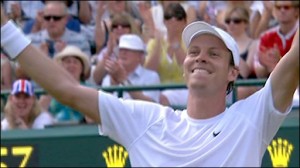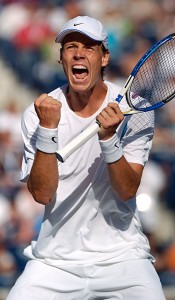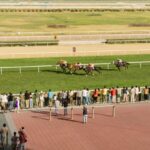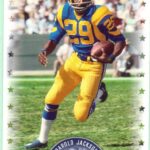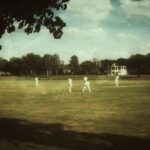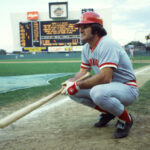Will Tomas Berdych’s First Wimbledon Final Be A Winning One?
The first time I watched Tomas Berdych play was in the fourth round of the US Open against Tommy Haas. He was only 18 then, but had already attracted some buzz for having knocked Roger Federer out of the Olympics in Greece just weeks earlier.
And at the time, it was impossible not to already be impressed with his shotmaking.
It was not like with Andre Agassi or Fernando Gonzalez, where even the viewers watching on TV could see and hear how hard the ball was being hit, but Berdych, when he had time to set up, had a way of almost casually flicking the ball into corners, lines, and angles that could not be retrieved.
In that first set alone, Berdych must have hit two-dozen winners, but it wasn’t enough. Haas squeaked out that first set and the big, lanky Czech went away after that.
The following year he returned, scoring his first victory over Rafael Nadal in Cincinnati, and capturing his first Master’s Shield in Paris. He had lacked the intangibles required to beat Haas a year earlier, but they appeared to be adding up, pairing with those stunning strokes, creating a potential Grand Slam champion.
So what happened after that? I’m not privy to Berdych’s private struggles, but over the next few years he appeared to regress. Part of the problem was Federer: That shock win over The Great Swiss in Greece brought Berdych to our attention, but also to Federer’s. In 2006 the Swiss, in the midst of his most dominant season, dealt a pair of lopsided straight-sets defeats to the Czech at Roland Garros and Wimbledon.
Berdych had more success against Nadal that year, as his 6’5” height made Nadal’s enormous spin less imposing and his flat hitting kept the Spaniard on defensive. He racked up two more wins in Canada and Madrid against the Nadal, but the latter of those two actually ended up being a detriment to the Czech’s momentum.
At the end of the match, in a moment of poor judgment he chose to mock the home crowd’s support for Nadal by gesturing for them to be quiet. In the next round against Gonzalez they poured their scorn on Berdych, rattling him and sending him home with his metaphorical tail tucked.
For the next couple of years his results were less impressive, as Nadal broke his losing streak against him and started a new six-match run of his own. Well into his 20s, Berdych simply had not built upon his early success.
Until the end of 2009, that is. They didn’t receive much attention at the time, but Berdych’s efforts were instrumental in leading the Czech team to the Davis Cup finals. He won tough five-set encounters against Gilles Simon of France in March, Juan Monaco of Argentina in July, and most impressively, Marin Cilic of Croatia in September.
Cilic was a hot hand at the time, having beating Andy Murray and reached the US Open quarters just before that, so to stop him in Croatia indicated big things ahead. And, about half a year later, they arrived when he topped Federer in Miami, snapping an eight-match losing streak against the Swiss. In Roland Garros he plowed through the field, beating Murray to reach the semis before falling just short against Robin Soderling in a superheavyweight clash. The Czech took one more set from Soderling than Federer had in the previous round, and in his post-match comments the Swede said that nearly every ball Berdych hit had been landing “six inches from the line.”
But Wimbledon may be the biggest payoff of all from the Czech’s efforts, as he has now beaten Federer for the second straight time. His quarterfinal win over the Swiss marks the first time in eight years that Federer will not reach the final round of the game’s most prestigious event. It also gives Berdych a chance to duplicate the feat of his fellow six-fiver Richard Krajicek, who ousted Pete Sampras at the same stage of the 1996 Wimbledon.
Like with Krajicek, Berdych at his best is in a different weight class against most opponents; in his straight-sets win over Novak Djokovic in the semis, it appeared the Serb wasn’t just fighting Berdych, but gravity.
And now Berdych, who hasn’t actually won a title yet this year, has a chance to win the game’s biggest. All he has to do is beat Nadal one more time.
Too bad he hasn’t done so since that noisy day in Madrid. It was the Spaniard who ended Berdych and the Czech Republic’s Davis Cup run last year, dispatching the big man in straights on Spanish clay in December.
Nadal was an impressive player in 2005 and 2006, but has grown further since then, reaching the game’s top ranking twice now and complimenting his clay court dominance with a Wimbledon and Australian Open title. He’s coming off a clay court season in which he went undefeated, sweeping all three Master’s Shields and the RG title.
His performance at Wimbledon has been impressive for nothing so much as his determination: Taken to five sets twice in week one, he has dominated week two ever since pulverizing Paul-Henri Mathieu in round four. Soderling was hitting so hard as to knock opponents’ rackets out of their hands in week one, but Nadal broke him down in the quarters, dropping just one set.
Murray played high-quality tennis in the semis, matching the Spaniard shot for shot for three sets. Nadal, however snatched the barest hint of an opportunity that Murray gave him in sets one and three. In set two, when Murray gave none, the Spaniard simply created an opportunity.
And that’s why it’s hard to bet on Berdych, as much progress as he has made of late. One can debate whether or not Berdych’s game, with its laser groundstrokes and spot-serving, is better for grass than Nadal defense, speed, and heavy spin.
What one cannot debate is that Nadal has so many non-quantifiable advantages that we might as well call him the Intangible Man.
Since winning his first major in 2005, Nadal has lost only one Grand Slam match after winning the first set. Since then, I can think of only two times – one against Federer in the 2006 RG final, and the other in this event against Soderling – where Nadal has served for a set and been broken. In neither occasion did he actually lose the set, though.
Anger has never prompted him to throw/break a racket on court or curse at a lines judge. What should be deflating setbacks like losing the fourth set of Wimbledon or debilitating knee injuries are to him mere delays of what must come to pass.
There are those who will never enjoy Nadal’s game as much as Federer’s, and they have that right. His aggressive, physical play may lack Federer’s magical, lighter-than-air qualities, but it’s a game full of its own marvels. Against this master of the intangibles, Berdych’s beautiful ballstriking probably won’t be enough.
It should provide a bright future for him, nonetheless, including a successful rest of 2010. But, on Wimbledon’s second Sunday, I pick Nadal in four.
